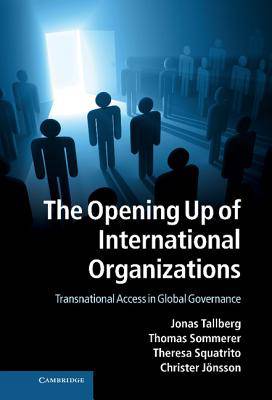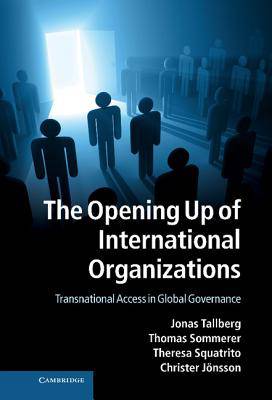
Je cadeautjes zeker op tijd in huis hebben voor de feestdagen? Kom langs in onze winkels en vind het perfecte geschenk!
- Afhalen na 1 uur in een winkel met voorraad
- Gratis thuislevering in België vanaf € 30
- Ruim aanbod met 7 miljoen producten
Je cadeautjes zeker op tijd in huis hebben voor de feestdagen? Kom langs in onze winkels en vind het perfecte geschenk!
- Afhalen na 1 uur in een winkel met voorraad
- Gratis thuislevering in België vanaf € 30
- Ruim aanbod met 7 miljoen producten
Zoeken
The Opening Up of International Organizations
Transnational Access in Global Governance
Jonas Tallberg, Thomas Sommerer, Theresa Squatrito
Hardcover | Engels
€ 145,95
+ 291 punten
Uitvoering
Omschrijving
Once the exclusive preserve of member states, international organizations have become increasingly open in recent decades. Now virtually all international organizations at some level involve NGOs, business actors and scientific experts in policy-making. This book offers the first systematic and comprehensive analysis of this development. Combining statistical analysis and in-depth case studies, it maps and explains the openness of international organizations across issue areas, policy functions and world regions from 1950 to 2010. Addressing the question of where, how and why international organizations offer transnational actors access to global policy-making, this book has implications for critical issues in world politics. When do states share authority with private actors? What drives the design of international organizations? How do activists and businesses influence global politics? Is civil society involvement a solution to democratic deficits in global governance?
Specificaties
Betrokkenen
- Auteur(s):
- Uitgeverij:
Inhoud
- Aantal bladzijden:
- 334
- Taal:
- Engels
Eigenschappen
- Productcode (EAN):
- 9781107042230
- Verschijningsdatum:
- 5/09/2013
- Uitvoering:
- Hardcover
- Formaat:
- Genaaid
- Afmetingen:
- 157 mm x 231 mm
- Gewicht:
- 725 g

Alleen bij Standaard Boekhandel
+ 291 punten op je klantenkaart van Standaard Boekhandel
Beoordelingen
We publiceren alleen reviews die voldoen aan de voorwaarden voor reviews. Bekijk onze voorwaarden voor reviews.









